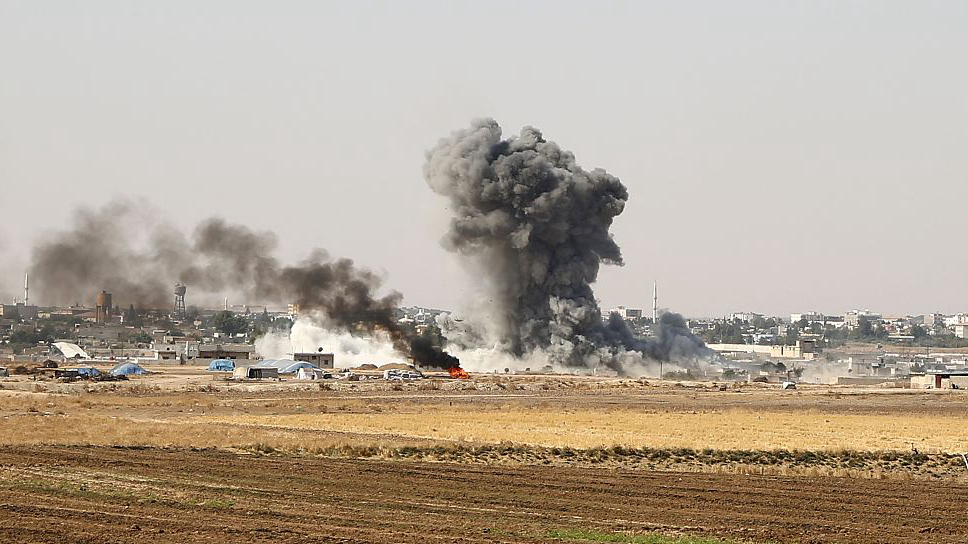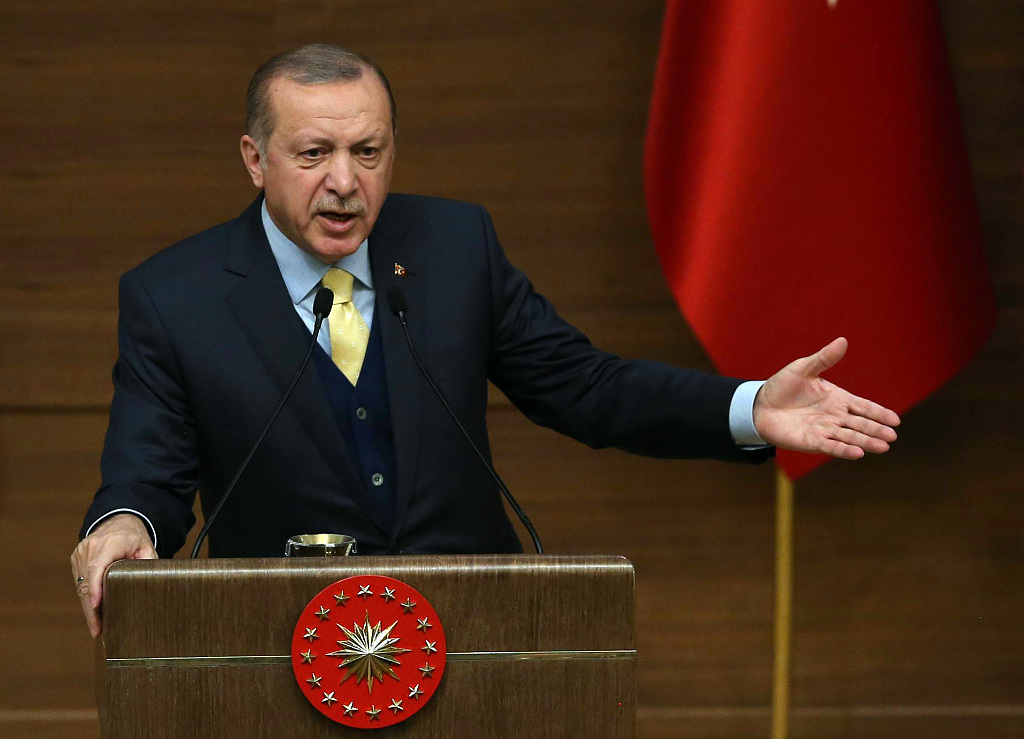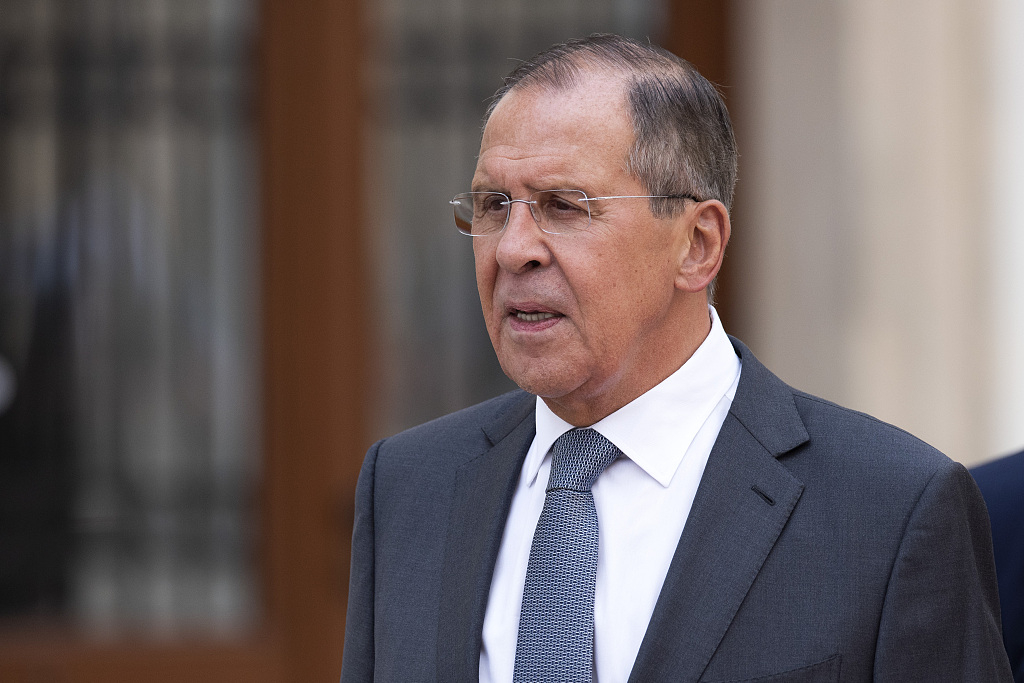
Smoke billows from the Syrian border town of Ras al-Ain, Syria, Oct 12, 2019. /VCG Photo
Smoke billows from the Syrian border town of Ras al-Ain, Syria, Oct 12, 2019. /VCG Photo
Editor's Note: Guy Burton is a visiting fellow at the Middle East Center at the London School of Economics and an adjunct professor at Vesalius College, Brussels. The article reflects the author's opinions and not necessarily the views of CGTN.
Last week, the U.S. President Donald Trump announced his decision to reduce American troops in Syria, most of that are based in the north of the country.
Almost immediately, Turkey began airstrikes and artillery bombardments in the area, ostensibly against who they claimed are terrorist groups. In fact, Turkey's aim is to curb the power of the Kurds who live there and hold de facto power over the area, having wrested it from the central authorities during the eight-year civil war in Syria.
Trump's decision sparked widespread critics across the American political class. He was accused of abandoning the Kurds, who as American allies, had borne the brunt of the fight against Islamic State, the extremist group which swept across eastern Syria and western Iraq five years ago. In his defense, Trump claimed that the Islamic State had been militarily defeated and the American public was tired of fighting foreign wars, including in Afghanistan and Iraq; it was time to bring their troops home.
Critics pointed out that a Turkish "invasion" following U.S. withdrawal would force Kurdish troops to pull away from guarding former Islamic State insurgents. Should that happen, the group's foreign fighters might abscond from the camps they are presently in, to cause security threats either in Syria or back in their home countries. Among those who have criticized Trump have been those from within his own Republican party, causing media speculation at home over how these grievances may influence the impeachment process by the Democrats that is slowly working its way through Congress.
But while Western media has focused on this, the impact of the U.S.' decision has played out in the region across several fronts. For Turkey, the military actions are targeted against the People's Protection Units, also known as the YPG. Turkey accuses the YPG of being associated with the Kurdish Workers Party (PKK), which operates on its side of the border and which it considers to be a terrorist organization.
Turkey has also claimed that by clearing the border area, it will establish a safe zone 20-30 kilometers wide. It claims that it will be a "safe zone" where many of the 3.6 million refugees who fled the Syrian war may eventually be re-settled.
Several practical considerations may be motivating Turkey's President Recep Tayyip Erdogan. A key aim is to weaken Kurdish power in the region. Erdogan and the wider Turkish political class cannot contemplate a strong and independent Kurdish presence, lest it acts as a motivation for other Kurds in Turkey.

President of Turkey Recep Tayyip Erdogan addresses mukhtars, heads of Turkish villages and neighborhoods, during the 44th Mukhtars Meeting in Ankara, Turkey, Jan 24, 2018. /VCG Photo
President of Turkey Recep Tayyip Erdogan addresses mukhtars, heads of Turkish villages and neighborhoods, during the 44th Mukhtars Meeting in Ankara, Turkey, Jan 24, 2018. /VCG Photo
Another is Erdogan's wish to improve his standing at home. Since 2017 the country's economic growth has been slowing. This year the economy is expected to contract. A weaker economy means less revenue and less willingness to support the 3.6 million Syrian refugees within its borders. If they can be encouraged to go home, that might help ease matters.
In addition, getting the refugees to go home might shore up Erdogan's political base. Although his party won the largest share of the vote in local elections earlier this year, his Justice and Development Party lost big cities like the capital, Ankara, Istanbul and Izmir. The loss of Istanbul was especially painful as Erdogan started his own political career as mayor there. He refused to accept his candidate's defeat and pressured the electoral authorities for a re-run, only to see the opposition win a landslide in June.
Turkey's current action in Syria has not gone unchallenged in the region. Saudi Arabia, Egypt and the United Arab Emirates (UAE) have all criticized Turkey's actions. Even though Syria remains suspended from the Arab League, its members have held an emergency meeting and condemned the Turkish "invasion." France and the European Union have also threatened sanctions against Turkey, prompting Erdogan to open the gates and let the refugees into Europe.
Compared to the Arabs and Europeans, only Russia has avoided direct confrontation. Russia is a key partner of the Syrian government, having defended the regime in Damascus diplomatically since the start of the war. In 2015 it provided direct military assistance.
Although the Syrian government opposes the Turkish presence in their country, Russia's Foreign Minister Sergey Lavrov has said that Turkey has "legitimate concerns." Its softer stance may reflect its ambition to be a potential mediator between Turkey and others arraigned against, from Damascus to the Arabs and Europe. If Russia is it is able to do this – and do so deftly – that will enhance its state and reputation as a key player in Syria and possible the wider Middle East.

Russian Foreign Minister Sergei Lavrov in Vienna, Austria, June 5, 2018. /VCG Photo
Russian Foreign Minister Sergei Lavrov in Vienna, Austria, June 5, 2018. /VCG Photo
However, success is not guaranteed. Moreover, the prospect of a settlement may become more remote the longer the Turkish operation goes on. The International Rescue Committee has suggested that the military actions may lead to more than 60,000 people being displaced. It may also harden attitudes on both sides, making it harder to reach an accord.
Russia has staked much on leading efforts to find a political solution in Syria. Having helped the regime regain control over much of the country, Moscow's interest now lies beyond the end of the war. It knows that a successful conclusion and rehabilitation of Syria into the international community will enhance its prestige and status as a key international player.
Last month, Russia reached agreement with Turkey and Iran, Syria's other main partners, to set up a constitutional committee. The constitutional committee was accepted by the UN as a way forward to finding a political solution.
But with Turkey having effectively upset the apple cart following the catalyst of American troop withdrawal, both Russia and others inside and outside the region will be wondering whether Syria is now entering a new phase of conflict – and how long and lasting the damage will be.
(If you want to contribute and have specific expertise, please contact us at opinions@cgtn.com.)